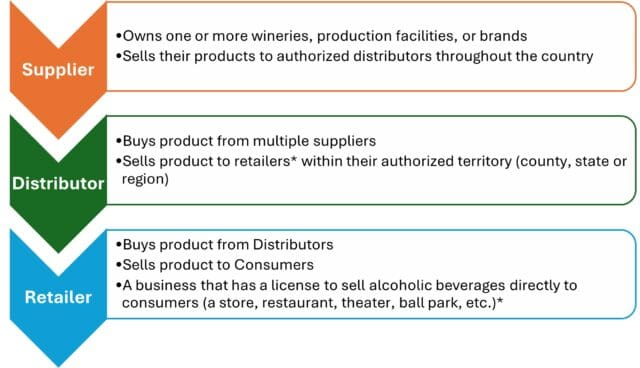There are multiple paths to get started in wine sales.
As a wine industry career coach, I find that wine sales roles are highly desired. But given the differences between supplier and distributor sales positions, it can be hard to determine which might be best for you.
Before we look at specifics, here’s a quick review of how alcoholic beverages are brought to market in the United States through the government’s three-tier system.

Supplier Sales
All wine sales originate with the supplier at the top of the three-tier system. A supplier may own or represent a single winery, such as Truchard or Fortunati Vineyards, or might be an expansive corporation with multiple brands, such as Gallo or Treasury Wine Estates. Regardless of scale, suppliers are responsible for selling their products to distributors across the country.
To achieve market success, suppliers employ sales directors or managers to oversee specific states or regions. Their primary responsibility is to collaborate effectively with the management teams of the distributors within their designated area.
This role may include:
- Tracking sales, points of distribution and new placements;
- Setting sales, placement and distribution goals;
- Managing inventory and point-of-sale (POS) data;
- Negotiating pricing and discounts;
- Providing motivational sales incentives;
- Conducting product training sessions for distributor sales teams;
- Collaborating with local sales representatives and making account calls together; and
- Establishing and maintaining relationships with key account buyers to support business growth.
Supplier sales teams typically report to a senior director or VP of sales, though this structure may differ depending on the company’s size and portfolio. These positions generally offer competitive compensation and may require frequent travel, a college degree and prior sales experience in alcohol beverage distributor or consumer product goods (CPG) companies such as Nestlé, Kraft or PepsiCo. Supplier roles can lead to career progression and increased earnings.
Distributor Sales
Once products are purchased from a supplier, distributors sell those products to buyers within their territory, with the goal of maintaining and increasing sales and distribution. The size of the sales force depends on the company’s geographic range and the number of suppliers and products it handles.
Small distributors typically have only a few sales teams covering all accounts in their geographic range.
Medium distributors may have multiple sales teams, often divided by account type. On-premise teams manage accounts where products are consumed on the premises, such as restaurants, theaters, ballparks and the like. Off-premise teams manage accounts where products are sold to customers and consumed off-property. These accounts commonly include grocery, convenient and liquor stores.
Large distributors often purchase products from multiple suppliers and carry a broad selection. Their teams are commonly divided first by the portfolios of specific suppliers, then subdivided further by on- and off-premise teams, thereby letting reps focus on fewer products for better coverage.
Regardless of which sales team a rep is on, their responsibilities could include:
- Selling, building and merchandising store displays;
- Writing and managing restaurant wine lists;
- Ordering and managing account inventory; and
- Providing product training to staff .
Distributor teams usually report to a sales director, sales manager, or VP of sales, but this varies by company size and portfolio.
When hiring sales reps, distributors often prefer candidates with a college degree, though it’s not always required — a background in sales, territory management, restaurant management or product purchasing can help overcome a lack of higher education. Sales roles usually require less overnight travel than suppliers and salaries vary by region. Larger companies offer greater career and salary advancement opportunities.
Are Wine Credentials Necessary?
Wine credentials, such as WSET (Wine & Spirit Education Trust), are qualifications that may enhance a resume for those interested in working in the wine industry. For sales positions, wine credentials are not always mandatory, but they can help set you apart from other candidates. I’ll explain this further in my next article.
In summary, working for a distributor is an excellent wine industry entry point, since there are more distributors than suppliers. Once you’ve developed your skills, these positions can serve as a stepping stone to a more lucrative sales role with a supplier.
As with any career change, it can take time to establish yourself in a new field. But highlighting the expertise you already have — and possibly combining it with next-level skill development — can go a long way to convincing employers that you’re serious about your new direction.
This series is designed to help you find your place in our industry. Please send any ideas, topics or questions you’d like us to address to Karen.wetzel@outlook.com